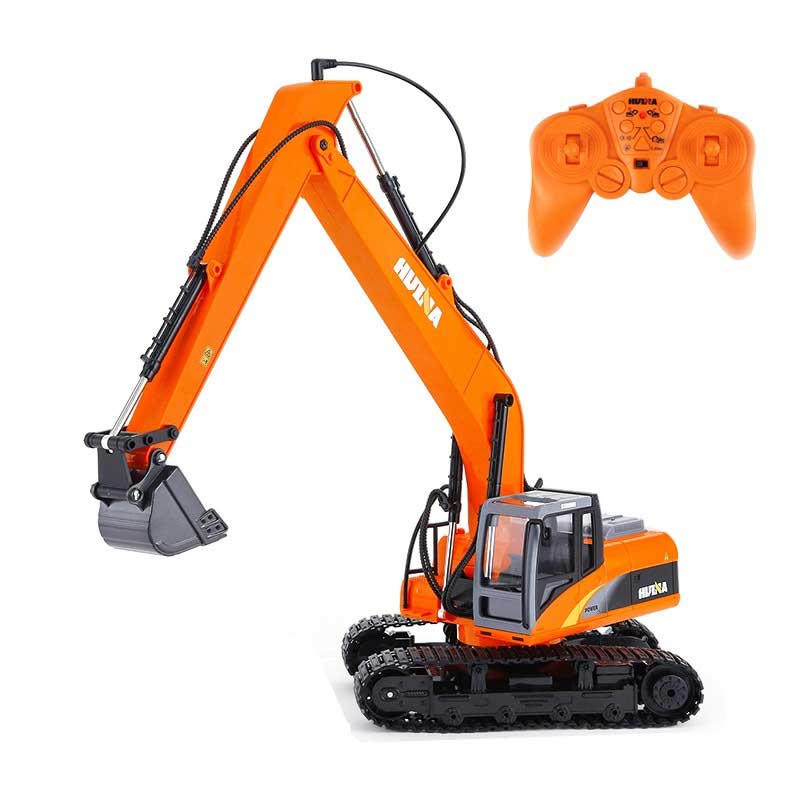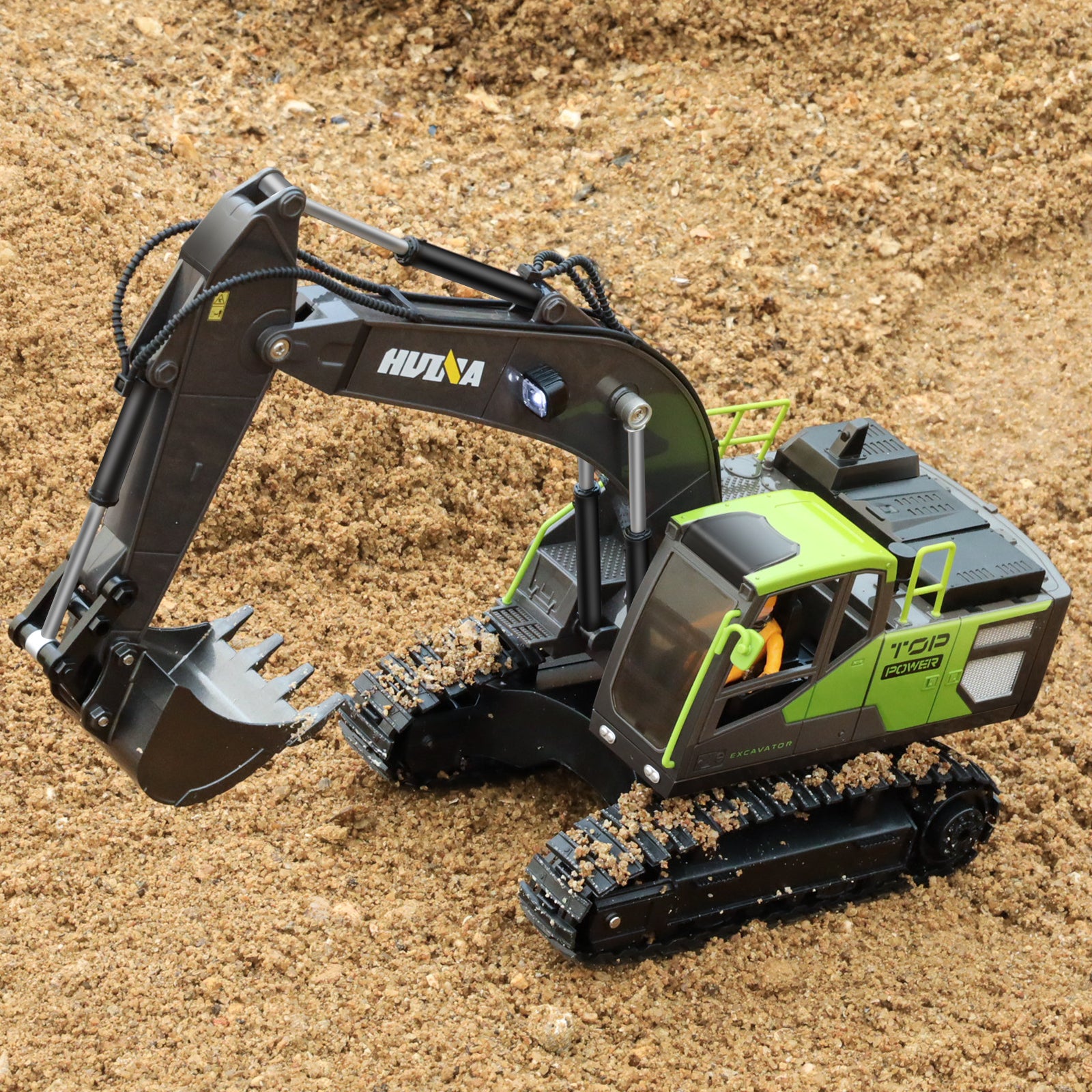Recognizing Exactly How Excavator Works and Its Effect On Performance
Excavators play a necessary function in building and mining procedures, relying upon a complex interaction of hydraulic and mechanical systems. Their capability to execute a selection of tasks rests on both their design and the innovation incorporated within. Understanding these elements can substantially affect functional efficiency and efficiency. As developments remain to reshape the industry, one need to consider just how these adjustments will affect future techniques and efficiency.
The Essentials of Excavator Mechanics

The Function of Hydraulic Equipments in Excavators
At the heart of excavator operation lies the hydraulic system, which plays a crucial role in powering the maker's movements and functions. This system utilizes pressurized hydraulic fluid to move power, enabling various activities such as moving, digging, and lifting. By harnessing the concepts of hydraulics, excavators can do jobs with exceptional accuracy and force, improving overall operational efficiency.The hydraulic system consists of crucial components, consisting of shutoffs, cyndrical tubes, and pumps, which interact to regulate the circulation and instructions of the liquid. When the driver engages the controls, the hydraulic liquid is guided to certain cyndrical tubes, converting the driver's commands right into physical motion. This device enables smooth and receptive actions, which are necessary in building and construction and excavation settings. double e volvo rc excavator. The performance of the hydraulic system straight influences the performance and versatility of the excavator, making it a vital component in modern-day excavation procedures
Trick Elements of an Excavator
Comprehending the vital components of an excavator is necessary for realizing just how this effective device runs. An excavator is composed of a number of substantial aspects, including the undercarriage, residence, arm, container, and boom. The undercarriage provides stability and movement, typically including wheels or tracks to navigate numerous terrains. Your home includes the engine and hydraulic systems, enabling the operator to manage movement and power the equipment. The boom prolongs from the house, making it possible for vertical reach, while the arm attaches to the container, helping with excavating and lifting operations.Additionally, the cab houses the operator, outfitted with controls for specific maneuvering. Each of these components plays a crucial duty in the excavator's overall performance, adding to its effectiveness and performance on construction websites. Recognizing these components aids in preserving and maximizing excavator efficiency, ensuring tasks are completed safely and effectively.
Accessory Adaptability and Its Advantages
Accessory flexibility is a crucial element of excavators, allowing operators to change between different devices customized for specific tasks. This flexibility not just enhances job effectiveness however also adds to cost-effectiveness by lowering the requirement for numerous machines. Comprehending the various kinds of accessories offered can considerably influence the total efficiency and performance of an excavator on task websites.
Sorts of Accessories
While excavators are largely recognized for their digging capabilities, their true adaptability exists in the vast selection of add-ons readily available. These add-ons boost the excavator's functionality, allowing it to carry out different tasks beyond excavation. Common attachments include buckets (for excavating and scooping), hydraulic thumbs (for realizing products), and augers (for piercing openings) Grapples are used for moving and handling debris, while rippers can damage up tough surface areas. Various other specialized accessories, such as plates and rakes, make it possible for excavators to adjust to certain job requirements. This variety not only raises the maker's utility throughout different sectors, consisting of building, landscape design, and demolition, yet likewise allows drivers to tailor their equipment to fulfill specific project demands effectively.
Enhanced Work Efficiency
Taking full advantage of work effectiveness is a key advantage of using numerous excavator attachments. Different accessories allow an excavator to do numerous jobs without needing to switch over devices, anchor conserving useful time and labor. As an example, utilizing a hydraulic hammer can damage concrete while a pail attachment can excavate dirt, enabling a seamless process. This versatility minimizes downtime associated with devices adjustments and enhances efficiency on-site. In addition, specialized attachments enhance accuracy in jobs such as grading or landscaping, resulting in greater top quality results. The capacity to adjust to various task demands not just improves operations yet additionally reduces the requirement for additional machinery, making sure that tasks are finished swiftly and efficiently. Generally, attachment flexibility substantially contributes to boosted work efficiency in excavation work.
Cost-Effectiveness and Flexibility
Cost-effectiveness is a substantial benefit of making check over here use of versatile excavator accessories. These accessories enable a solitary excavator to do numerous tasks, reducing the demand for extra equipment and labor - double e volvo rc excavator. By switching over in between containers, hammers, and grapples, operators can take on various projects, from excavating to demolition, consequently making best use of devices utilization. This versatility not just reduces functional expenses but also reduces downtime connected with altering equipment. In addition, the capacity to tailor excavators with specialized accessories improves productivity, as they can efficiently take care of varied tasks according to task demands. In conclusion, the mix of cost-effectiveness and versatility in excavator add-ons adds to improved functional performance and source allotment in building and construction and excavation tasks

Advanced Innovation in Modern Excavators
Modern excavators are progressively furnished with sophisticated technology that changes excavation procedures. Automation streamlines operations, while boosted gas performance minimizes functional costs. Additionally, clever control systems improve accuracy and safety and security, marking a significant advancement in excavation devices.
Automation in Excavation Processes
As excavation technology progresses, automation has emerged as an essential part in improving effectiveness and precision on task sites. Modern excavators are equipped with innovative automated systems that promote tasks such as grading, excavating, and trenching with marginal operator intervention. These systems make use of sensors, GPS, and equipment discovering algorithms to ensure exact positioning and deepness control, considerably minimizing the margin for mistake. Furthermore, automation permits operators to concentrate on critical decision-making instead of manual controls, leading to enhanced productivity on the whole. Such developments not just simplify process yet also improve safety and security by minimizing human mistake in intricate operations. The assimilation of automation in excavation processes represents a significant development in construction technology, driving the industry towards higher efficiency and efficiency.
Enhanced Fuel Effectiveness
Developments in technology have actually also resulted in considerable enhancements in gas efficiency for modern excavators. Modern machines are furnished with innovative engines that optimize power outcome while minimizing gas consumption. These engines make use of cutting-edge burning modern technologies, such as turbocharging and straight gas injection, to enhance performance and efficiency. Additionally, light-weight products in building decrease overall weight, enabling less energy expense throughout operation. The intro of variable rate controls makes it possible for drivers to adjust engine efficiency according to details jobs, even more lessening gas use. As a result, these improvements not just lower functional prices however likewise add to environmental sustainability by reducing exhausts. Generally, enhanced gas effectiveness in excavators is a necessary advancement that reinforces efficiency and financial stability in the building industry.
Smart Control Equipment
While operators browse progressively complex job sites, wise control systems in excavators have arised as vital tools for improving efficiency and accuracy. These sophisticated innovations utilize formulas and sensors to monitor different parameters such as lots weight, terrain problems, and operational efficiency. By immediately readjusting hydraulic features, smart systems optimize equipment performance, bring about improved efficiency and reduced endure parts. Additionally, drivers profit from intuitive user interfaces that provide real-time feedback and diagnostics, enabling educated decision-making. This integration of innovation not just improves procedures but also lessens human mistake, contributing to more secure work settings. As the construction industry remains to progress, clever control systems will certainly play a vital function fit the future of excavator performance and performance.
Enhancing Functional Effectiveness With Excavators
Excavators play an essential role in enhancing operational effectiveness across different building and excavation jobs. Their adaptability enables numerous jobs, consisting of material, digging, and training handling, which streamlines workflows and lowers the demand for added devices. With powerful hydraulic systems, excavators can carry out durable tasks with accuracy, substantially lowering the moment needed to complete projects. The integration of advanced technology, such as general practitioner and automated controls, better enhances their operation, making it possible for drivers to attain higher precision and minimize product waste. Furthermore, contemporary excavators are developed to consume much less gas and reduce exhausts, adding to both price savings and environmental sustainability. By utilizing excavators effectively, construction groups can improve efficiency, meet task due dates, and boost overall website management. This multifunctionality and performance make excavators crucial tools in the modern building and construction landscape.
The Future of Excavators in Building And Construction and Mining Industries
As the building and mining industries evolve, the future of excavators is positioned for substantial improvement driven by technological advancement and changing functional demands. Breakthroughs in automation and man-made knowledge are improving excavator capabilities, enabling for enhanced accuracy and efficiency in procedures. Independent excavators are emerging, lowering the requirement for human treatment and reducing the threat of accidents.Moreover, the you can try this out assimilation of telematics and IoT technology allows real-time surveillance of machine efficiency and anticipating maintenance, enhancing uptime. Green layouts, including hybrid and electric designs, are getting traction, aligning with sustainability objectives within the industry.Additionally, using innovative products and lighter designs improves gas performance while maintaining performance requirements. As these patterns progression, excavators will certainly play a vital role in fulfilling the raising demands for productivity and security in building and mining, inevitably changing functional landscapes.
Regularly Asked Questions
Exactly How Do Climate Condition Affect Excavator Performance?

Weather significantly influence excavator efficiency, as rain and mud can hinder grip and security, while extreme temperatures may influence hydraulic systems. Operators should adapt to these variables to assure optimal functionality and safety and security throughout procedures.
What Safety And Security Actions Should Operators Adhere To While Making Use Of Excavators?
Precaution for excavator drivers include putting on proper personal protective devices, performing pre-operation inspections, making sure appropriate interaction with ground personnel, keeping a safe range from overhead threats, and adhering to well-known operational methods to avoid crashes.
How Commonly Should Excavators Be Maintained for Ideal Efficiency?
Excavators ought to be kept routinely to ensure peak efficiency, usually every 250 operating hours or as defined by the producer. Regular checks enhance dependability, protect against unexpected failures, and prolong the lifespan of the devices.
What Is the Average Life Expectancy of an Excavator?
The ordinary lifespan of an excavator usually varies from 10,000 to 15,000 hours of operation. Variables affecting longevity include upkeep techniques, operating conditions, and the high quality of the equipment itself, impacting overall productivity and effectiveness.

Can Excavators Operate Uneven Surface Effectively?
Excavators can run successfully on unequal terrain due to their expressed designs and flexible tracks. These features enable them to keep stability and grip, enabling effective procedure in difficult atmospheres generally come across in building and construction and landscaping tasks. Each of these components plays an essential function in the excavator's total capability, contributing to its efficiency and effectiveness on construction sites. Optimizing work performance is a key benefit of making use of various excavator accessories. While operators navigate increasingly complex job sites, smart control systems in excavators have actually arised as essential tools for boosting performance and accuracy. Excavators play a necessary role in boosting functional performance across various construction and excavation tasks. Breakthroughs in automation and man-made intelligence are reshaping excavator capabilities, permitting for improved precision and efficiency in procedures.
Comments on “The Remote Control Excavator: Your New Best Friend for Landscaping Projects”